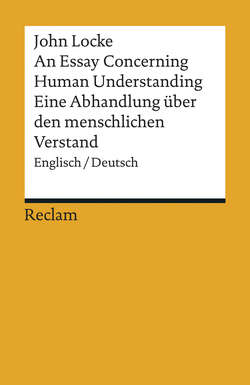Читать книгу An Essay Concerning Human Understanding / Ein Versuch über den menschlichen Verstand. Auswahlausgabe - John Locke - Страница 25
На сайте Литреса книга снята с продажи.
CHAPTER XV
ОглавлениеOf Duration and Expansion, considered together
§ 1. […] Distance or Space, in its simple abstract conception, to avoid confusion, I call Expansion, to distinguish it from Extension, which by some is used to express this distance only as it is in the solid parts of Matter, and so includes, or at least intimates the Idea of Body: Whereas the Idea of pure Distance includes no such thing. […]
[…]
§ 5. Time in general is to Duration, as Place to Expansion. They are so much of those boundless Oceans of Eternity and Immensity, as is set out and distinguished from the rest, as it were by Land-marks; and so are made use of, to denote the Position of finite real Beings, in respect one to another, in those uniform infinite Oceans of Duration and Space. These rightly [212]considered, are nothing but Ideas of determinate Distances, from certain known points fixed in distinguishable sensible things, and supposed to keep the same distance one from another. From such points fixed in sensible Beings we reckon, and from them we measure out Portions of those infinite Quantities; which so considered, are that which we call Time and Place. For Duration and Space being in themselves uniform and boundless, the Order and Position of things, without such known setled Points, would be lost in them; and all things would lie jumbled in an incurable Confusion.
[…]
§ 9. There is one thing more, wherein Space and Duration have a great Conformity, and that is, though they are justly reckoned amongst our simple Ideas: Yet none of the distinct Ideas we have of either is without all manner of Composition, it is the very nature of both of them to consist of Parts: But their Parts being all of the same kind, and without the mixture of any other Idea, hinder them not from having a Place amongst simple Ideas. Could the Mind, as in Number, come to so small a part of Extension or Duration, as excluded Divisibility, that would be, as it were, the indivisible Unite, or Idea; by repetition of which, it would make its more inlarged Ideas of Extension and Duration. But since the Mind is not able to frame an Idea of any Space, without Parts; instead thereof it makes use of the common Measures, which by familiar use, in each Country, have imprinted themselves on the Memory (as Inches, and Feet; or Cubits, and Parasangs; and so Seconds, Minutes, Hours, Days, and Years in Duration:) The Mind makes use, I [214]say, of such Ideas as these, as simple ones: and these are the component Parts of larger Ideas, which the Mind, upon Occasion, makes by the addition of such known Lengths, which it is acquainted with. On the other side, the ordinary smallest measure we have of either, is look’d on as an Unite in Number, when the Mind by division would reduce them into less Fractions. Though on both sides, both in addition and division, either of Space or Duration, when the Idea under Consideration becomes very big, or very small, its precise Bulk becomes very obscure and confused; and it is the Number of its repeated addition, or divisions, that alone remains clear and distinct, as will easily appear to any one, who will let his Thoughts loose in the vast Expansion of Space, or Divisibility of Matter. Every part of Duration is Duration too; and every part of Extension is Extension, both of them capable of addition or division in infinitum. But the least Portions of either of them, whereof we have clear and distinct Ideas, may perhaps be fittest to be considered by us, as the simple Ideas of that kind, out of which our complex modes of Space, Extension, and Duration, are made up, and into which they can again be distinctly resolved. Such a small part in Duration, may be called a Moment, and is the time of one Idea in our Minds, in the train of their ordinary Succession there. The other, wanting a proper Name, I know not whether I may be allowed to call a sensible Point, meaning thereby the least Particle of Matter or Space we can discern, which is ordinarily about a Minute, and to the sharpest eyes seldom less than thirty Seconds of a Circle, whereof the Eye is the centre.
[…]
